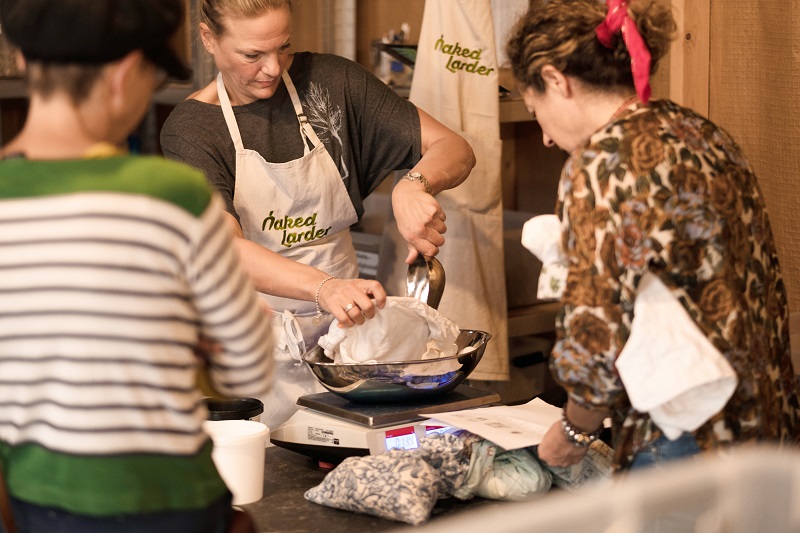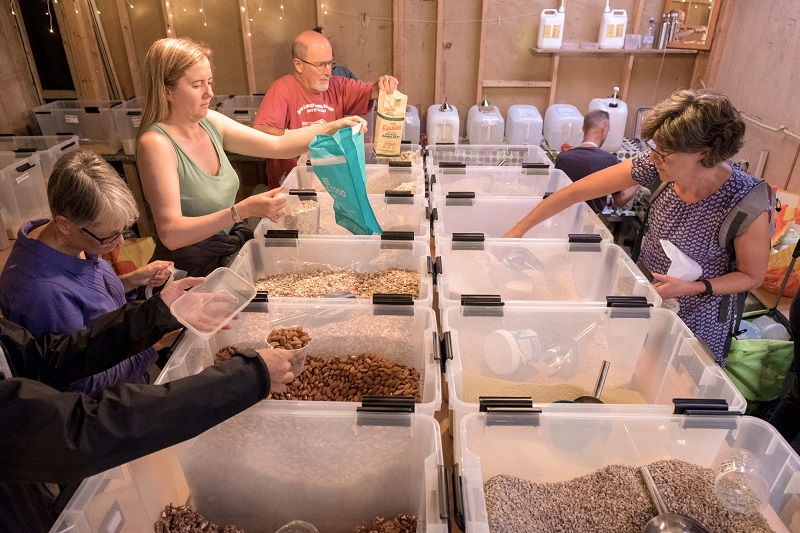 Photo credit: Phili Denning, Naked Larder
Photo credit: Phili Denning, Naked Larder
Archived project
Please note that the content on this page has been archived and is not actively reviewed at present.
Tired of unnecessary plastic packaging and inefficient recycling, Phili Denning was inspired to establish Naked Larder as a means of providing a place where people can come to source dry foods and household items with minimal packaging, supporting a more ethical and sustainable food system.
Aims and Structure
Since its creation, Naked Larder has grown and grown and now boasts 750 members and roughly 160 orders per month. It's aim is to challenge wasteful shopping habits and connect the local community, offering a buying system where customers can order a range of foods, toiletries and cleaning products for collection. All items are ethically sourced and purchased in bulk to ensure a minimal impact on the earth and to keep costs nice and low!
Collections take place monthly and you can order in amounts of 0.25kg, 0.5kg and full kilograms for dry goods and 0.5l, 0.75l and full litres for cleaning products. Orders are placed online for collection at a prearranged time then customers weigh out the products using their own reusable containers and you’re ready to go and enjoy your package-free goodies.
Produce
Products include grains, beans & pulses, nuts, dried fruit, flours, pasta, cereals, eco-friendly cleaning and body care products; where possible items are organic and plastic free. For a full product list and more details on suppliers, visit the Naked Larder website.

Successes and Challenges
In a short time Naked Larder has become a household name in the South London food scene, with publications featured in Pebble magazine, the Evening Standard and many more. In October they teamed up with the Brixton Pound to host a fantastic event for Urban Food Fortnight to highlight the food and packaging waste problem.
There are also many hurdles to overcome when setting up a food co-op including choosing suppliers and what products to source. For Phili, a big question was whether to source exclusively organic products; a compromise was made in the end to have a mixture of both, making food costs accessible and ethical. Other considerations when starting a food co-op or buying group are the initial start-up costs of equipment, storage etc and getting the first core group of members.
"There's a lot of logistics involved in running a food co-op but also a huge amount of satisfaction in connecting with people and bringing such a positive service to your community"
If you are inspired and want tips on how to start your own food co-op, then check out Phili’s blog on how she started Naked Larder.
Future
Naked Larder continues to grow and raise awareness about the huge issue of packaging waste, aiming to rebalance our food buying habits.
“Setting up a food co-op is a fantastic way to get involved in your local community and provides a fun way for many local people to get to know each other”
This year, they launched a franchise scheme with the intention of empowering others to set up a buying group using their low cost model to help bring affordable packaging free shopping to a wider range of people. Click here if you're interested in learning more.
Phili Denning spoke to the Jellied Eel last year about her food co-op journey, check out the interview here.
Food Co-ops: Building community wealth, supporting the planet and championing farmers.
Sustain
The Green House
244-254 Cambridge Heath Road
London E2 9DA
020 3559 6777
sustain@sustainweb.org
Sustain advocates food and agriculture policies and practices that enhance the health and welfare of people and animals, improve the working and living environment, promote equity and enrich society and culture.
© Sustain 2024
Registered charity (no. 1018643)
Data privacy & cookies
Icons by Icons8